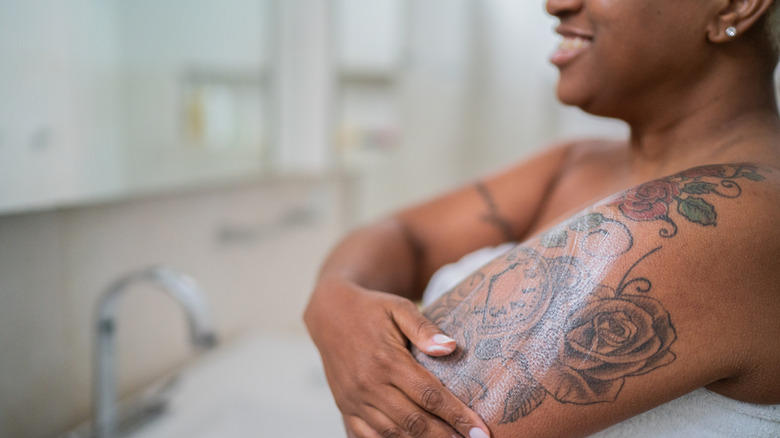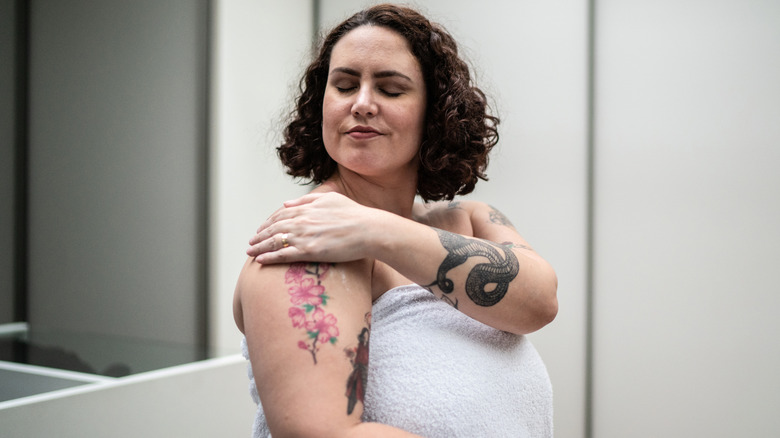How To Care For Tattoos On Mature Skin
As mainstream as tattoos have become — almost 30% of U.S. adults are rocking at least one according to the Pew Research Center — not everyone gets their tattoos when they're young. Some people start getting tattoos the moment they turn 18 and continue to do so for the rest of their lives, while others wake up on their 50th birthday and decide it's finally time. In other words, you're never too old to get a tattoo.
Tattoos may not have an age maximum, but because they're an aggressive form of body art that disrupts the skin, they require proper care. If you're older, that care becomes even more important. "Mature skin may be thinner, drier, and crepey compared to younger skin," Double Board Certified Dermatologist, Dr. Brendan Camp of MDCS Dermatology exclusively tells Women. "This may affect the rate at which it heals after getting a tattoo. It may also affect how the tattoo appears on the skin or is prone to distortion as a result of changes in skin texture, coloring, and laxity."
Skin starts to age around 25, as collagen production begins to slow down, but it's after 40 when things start to speed up. So, using that as a general marker of "mature skin," whether you're getting your very first tattoo or you're adding to your collection of sticker sleeve tattoos, there are some things to keep in mind if you're over 40 and want to make sure your tattoo looks good for the long-haul.
Talk to your dermatologist first
Although the likelihood of many people talking to their dermatologist before getting a tattoo in their 20s is probably pretty low, older skin isn't the same as the skin of our youth and needs to be cared for differently. That's why it's best if you're over 40 to avoid getting a tattoo on a whim. Talk to your doctor first.
"Prior to getting a tattoo, have your skin examined by a board-certified dermatologist to ensure there are not suspicious moles or growths developing within the area the tattoo is to be placed," says Dr. Brendan Camp. "I have seen patients develop skin cancers within a tattoo, and the tattoo becomes altered in appearance after the skin cancer is removed or treated."
According to the American Cancer Society, skin cancer is the most common cancer in the U.S., especially in people over 50. Even if you've been a die-hard SPF user your entire life, it doesn't mean you're in the clear — the sun isn't the only thing that might contribute to someone's risk of getting skin cancer. It's also worth asking your dermatologist about the best placement for a tattoo based on how the skin ages. For example, getting a tattoo on crepey skin or an area that's most likely to become crepey in time, won't do your tattoo any favors in how it looks. These may be things a 25-year-old never considers, but it's something a 45-year-old should.
Make sure it has a protective barrier
No matter your age, tattoos require a particular form of aftercare. But with skin that's a bit on the dryer and/or thinner side, protection becomes even more important — especially if you want to prolong the integrity of the tattoo. You don't want to drop hundreds (or thousands) of dollars on something like an illustrative tattoo style, just so it can look different in a year or two.
"A good aftercare treatment will create a barrier on the skin that protects it from external stressors, like dirt and pollution, provide a healing environment, and promote healing," says Dr. Brendan Camp. "Examples of barriers include petrolatum-based ointments, plastic wrap, gauze, and medical-grade transparent waterproof dressings."
Although a professional tattoo artist will apply something like A+D ointment to your tattoo before covering it and sending you on your way, that's just the beginning. If you want to keep your fresh ink clean and protected, it's paramount that you cover it for the first few hours, and then moisturize it for a few days afterward. However, protection from the sun for the life of the tattoo is of the utmost importance. "Don't ignore the sun in the fall or winter," says Dr. Camp. People tend to think that winter sun is harmless, but it really isn't. All you need is 15 minutes of sun exposure to damage your skin.
Keep it clean
Older skin gets put through the wringer. As we age, our skin becomes noticeably thinner (thanks to the aforementioned reduction in collagen) and our immune systems are no longer what they used to be, creating a perfect storm for skin-related infections. According to a 2004 study published in Aging Research Reviews, elderly people are more prone to skin infections due to age-related and environmental factors. From bacterial to fungal infections, older skin really gets the brunt of it. While 40s and 50s, or even 60s aren't exactly "elderly," it's certainly not young either — at least from the skin's standpoint — so, it's really important to keep your tattoo clean while it's recovering.
Dr. Brendan Camp recommends focusing not only on applying healing ointment but also washing your tattoo regularly with a gentle cleanser and warm water. Stay away from soaps that have harsh irritants or exfoliative properties. All you need is a simple cleanser that you apply with your hands and rinse off with warm water. If your tattoo is in an area where the skin is a bit on the thinner side than the rest of the body, keeping it clean is even more important due to its susceptibility to cuts and scratches.
It may take longer to heal
If you get a tattoo on your mature skin and notice that it's not healing as quickly as it did when you were 30 years old, don't freak out. This is normal. Age messes with the structure and function of the skin, so wounds take more time to heal, explains Dr. Brendan Camp. All this means is that you need to be diligent in keeping your tattoo clean, covered, and moisturized longer than you would have back in your heyday.
Tattoos are a beautiful way to express yourself. Whether it's an affirmation tattoo, a matching tattoo with your bestie, or a method used to help start the healing process after losing a loved one, tattoos can be just as therapeutic as they are extraordinary works of art. While 24% of those who get tattoos reportedly regret the decision at some point later in their lives, according to the Pew Research Center, the majority of people don't. So if you've been itching to get your first tattoo or 25th tattoo and you're over 40, just go for it. Non, je ne regrette rien, right?




